| Web
and Book design,
Copyright, Kellscraft Studio 1999-2008 (Return to Web Text-ures) |
 (HOME)
|
|
THE RARITY OF GENIUS A TRAVELER in England is very much
struck, as he goes from one provincial town to another, at the absence in the
guide book of great names which stand for national glory. In a newer country
like ours we find this scarcity still more marked. How many towns of five or
ten or even twenty-five thousand inhabitants one may pass through that are not
notable for any personality of genius! Even the mechanical genius in which this
country is so rich, can by no means be found in every part of it. There is, to
be sure, a notably high average quality of citizenship such that a great many
persons in each community exceed the knowledge of the ancients in some
departments of human thought. Where all are distinguished, none are
distinguished. With all these allowances, however, one feels jealous of human
reputation when any particular neighborhood fails to shine in human annals.
Someone has said that only one life in a hundred millions is remembered
permanently. The estimate is large. A poet has commemorated the fact that we
have evidence of the existence of some great nations of which not a name
remains. "They had no poet and so they died." This little essay would inquire why
genius or, if you choose, great distinction in a certain line of human effort,
is so rare. The probable answer, it would appear, is not the obvious answer,
namely, that supreme talents are rare. Genius has been defined as the capacity
for hard work. Is not the answer in this, that so few men of excellent ability
have devoted themselves by choice deliberately and intensely with all their
faculties to the accomplishment of an outstanding achievement? This is not to
say that any well-educated man of good ability can be an Emerson. There are
fine, inherent qualities which, added to intense application, have placed
certain names on the roll of geniuses. What we contend for is this, that men
like Poe and Burns, had they not dissipated their powers, might have left us
great epics rather than brief fragments. Even Lowell, it is thought and as he
himself has hinted, might, had he set himself steadily to the task, have left
us a literary monument far more superb than the work he has left. Here we would
hazard the judgment that probably no town of ten thousand inhabitants has
failed of men who, had they set themselves to one fixed purpose of creation,
would have left a permanent monument of achievement. When we stand in the midst of some
fair landscape and see the brilliant play of light and the glory of earth and
sky, and the wealth of teeming nature, we are conscious of a sad regret that so
much fair preparation, that so fine a theater for action should have failed in
the production of great men. England is broad, but has only one Runnymede.
America owns a single Concord. Massachusetts can pride herself that so many
foci of power are located within her narrow limits. But with the preparation of
an education in liberty and law and the call of a new world, we at times wonder
that no more has been done after such great beginnings. Somebody, some years
ago, worked out the probable number of living descendants of the Massachusetts
Coast Colonies at fifteen millions. The names in "Who's Who" have recently been classified by states and it has been found that the quota for the eastern states and, particularly, for Massachusetts, is far larger in proportion to the population than in the newer states. Yet we must believe that indolence is responsible that many men of fine abilities stop short of the highest achievements. The Yankee character has been supposed to be restless, The descendants of the first settlers of Massachusetts should frankly admit that there are multitudes of them in the back wash of civilization. We have in mind a fine scholar of large native powers whose broadest influence did not extend beyond the occasional office of a selectman in a town of six hundred people. There are always ten times more persons who will die for their country than will live for it. 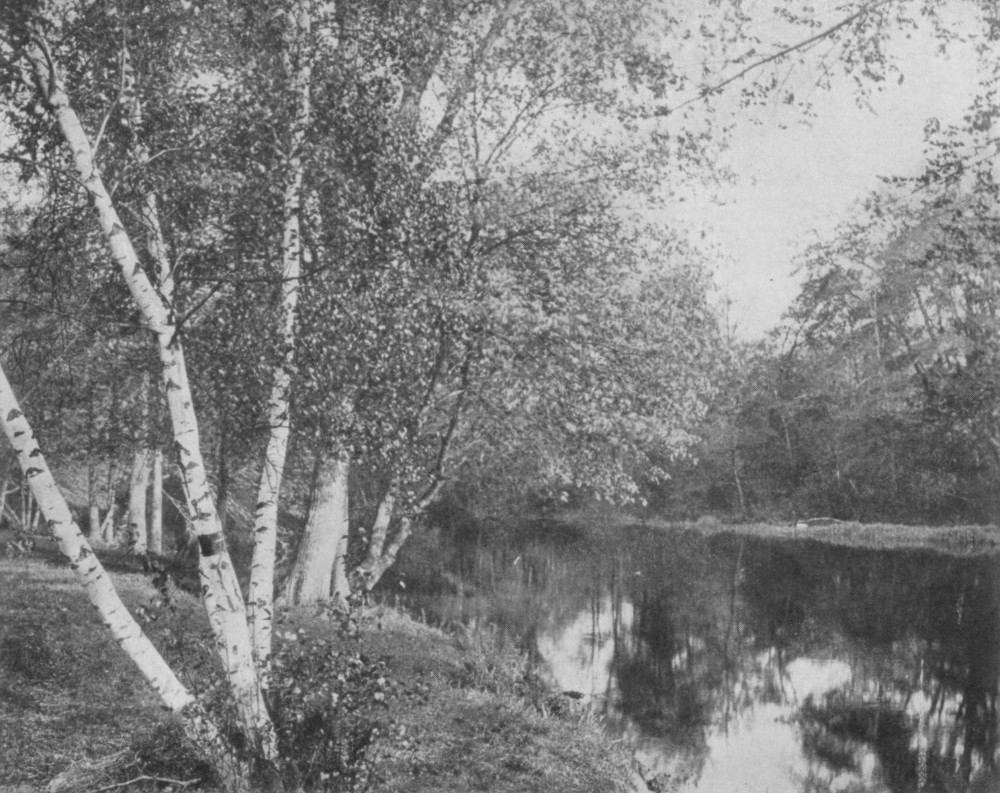 CONCORD BIRCHES 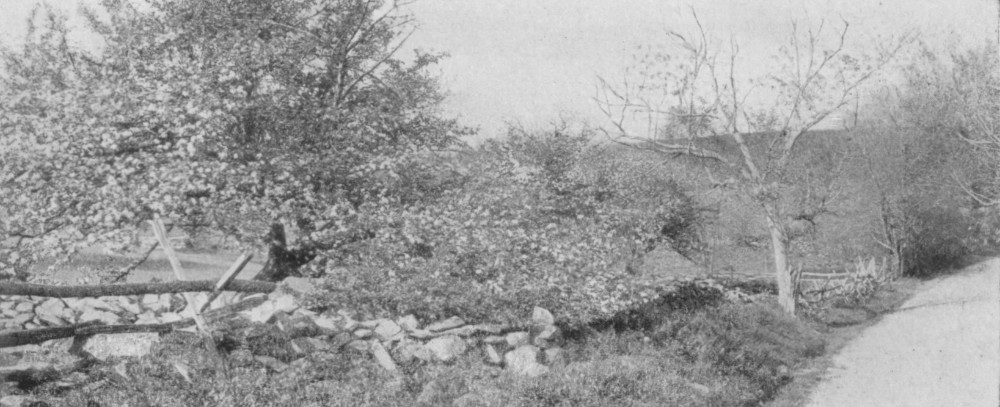 GOING BACK TO NATURE - WORCESTER COUNTY  NEIGHBORHOOD GOSSIP - SAUGUS 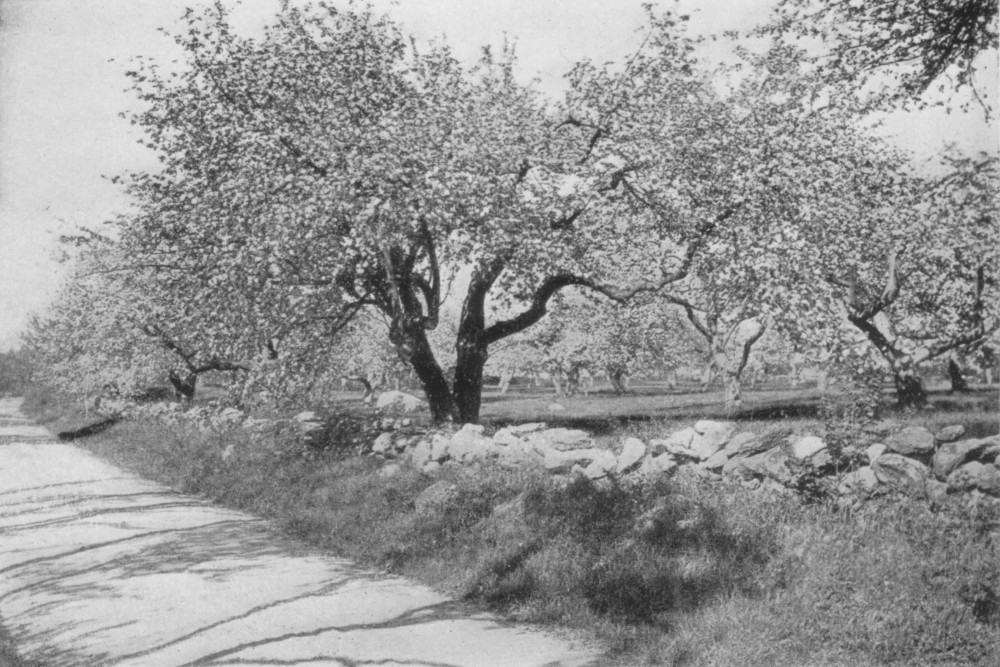 DREAM AND REALITY - GRAFTON A NANTUCKET THREE DECKER The superficial have accepted as a
final dictum the ancient saying that "in making many books there is no
end." We make no pretensions to wide research but we think we
voice the experience of many when we say that scarcely a week elapses that we
do not seek and seek in vain for authoritative information in some department
of human knowledge. To an astonishing extent, history is blank. The notorious
phrase of Napoleon that "history is a legend agreed upon," while a
trifle too broad like all proverbs, is so far true that we blush. Scientific
information is still at a premium, and, far beyond necessity, literature is
lean. The world war is scarcely over, yet
many of the greatest movements in the war are veiled in mystery and probably
always will be. What we do know in comparison with what we easily might know
will always be an infinitesimal fraction, Here then we plead that the youth of
Massachusetts, with the background of their history and the standpoint of their
present opportunity, may dedicate themselves in sufficient numbers to the
accomplishment of important work that never has been done. NEW ENGLAND IN WINTER THE recent increase in interest in
out-of-doors winter sports is awakening many persons for the first time to one
of the aspects of beauty which ought long since to have been a larger factor in
our thought. The curling snow fingers that fall gradually away in curves from
the old picket fences; the white festoons that drape the evergreens; the old
door posts with their caps of snow; the graceful birches laden with their white
burden and drooping in bows of every degree of curvature until some even meet
the ground; the half-hidden cottages; the fantastic aspects of the snow shapes
in their draperies and wave effects, — all these are charming elements of
northern winter life. The snow itself has recently been
found to be a mine of hidden beauties hitherto neglected. An enthusiast who has
made three thousand individual magnified photographs of snowflakes has so far
found no two alike. If a mathematician were called upon to compute on the
theory of chances the probable number of regular crystalline snowflake forms he
would give us an answer high up in the billions. Most of these forms are
hexagonal crystals. A very great many of them may supply exquisite patterns for
embroidery, for lace and for every sort of designing, Little do we think as we
set our foot on the first snow that we are probably crushing a million crystals
each of great beauty, each individually distinguished. One of old made the
query, "Hast thou entered into the treasures of the snow?" Did he
suspect this modern revelation? Probably not. The stars under foot are as
wonderful as those overhead. What a delicate inconceivably subtle
influence must guide formations of these crystals so that each follows a new
design! We are led to wonder whether there is a limit to these designs. Snow in certain forms, crystallized under very low temperatures, sometimes produces a three-sided crystal. These are not so beautiful but they are, nevertheless, extremely interesting. 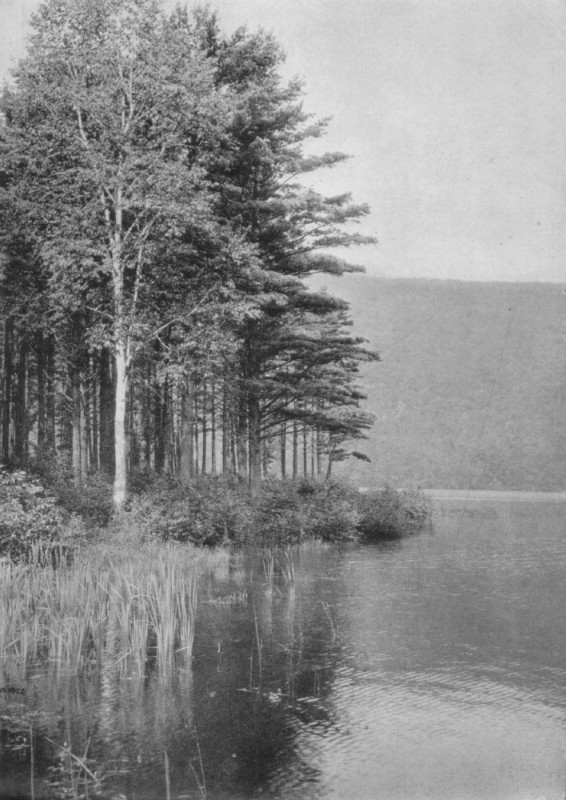 ECHO LAKE - BERKSHIRES  FROM BERKSHIRE HEIGHTS 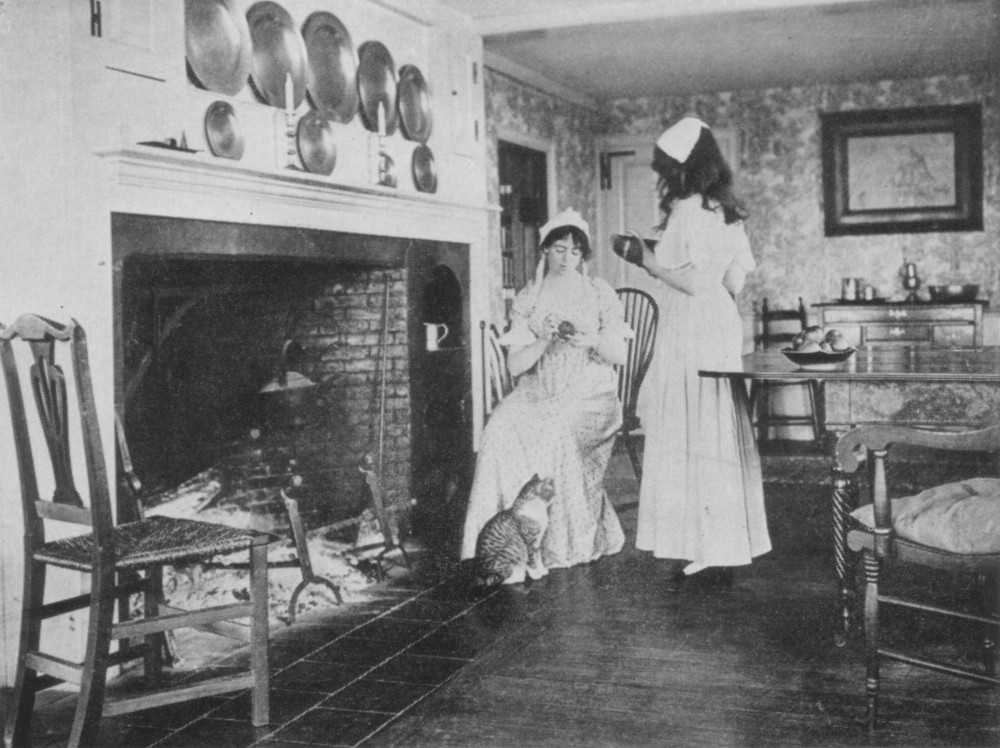 THREE FRIENDS - FRAMINGHAM The snow in the open is influenced
in its contour wholly, of course, in the same way as water and sand. A
duplication of a curdled sky may be seen in many a snow landscape and again on
the blowing sands which are here and there to be found in New England. The
shape of a sea wave is of ten duplicated to a nicety in snowdrifts which curl
at their crests with all the delicacy possible. The spindrift of the sea is
also duplicated in the loose snows which blow from the crests of such drifts. We are greatly indebted to the
recent fashion of wintering in the country because it is possible the fashion
may awaken dwellers in the country of rigorous winters to the desirability of
their place of residence and to its winter charm, scarcely inferior to that of
summer. The mass of mankind, largely untouched by intrinsic beauty, may be led
to see beauty, when it becomes a fad to do so, and, all unconsciously to
themselves, persons may awake to recognize the splendors which have hitherto
lain, asking attention, around them. It is beyond our purpose if it is not
beyond our powers to describe intimately many phases of winter beauty. These
themes have furnished the poets with no small part of their inspirations. The
recent work of Mr. Daniel L. Cady in describing the homely occupations of the
country has filled a void in our literature which was in great need of
treatment. Under the guise of dialectic forms and from the mouth of the more or
less untutored farmer he has expressed many shades of rural life in a manner
which shows the keenest observation. The importance of such work is understood
by those who know how rapidly the old rural conditions are passing away. There
are many things which are already almost archaic in American life, and to
preserve a pictorial and literary record of them will very much assist us in
securing the rotundity of history. UNCLE HY'S COLT THE beautiful snow is availed of by
the farmers for breaking colts, Uncle Hy was a burly man of heroic build and
when he heard of a colt that had grown to a complete horse estate without ever
having admitted a master he thought he saw his opportunity, as the price was
not too much and the animal was a beauty. A sturdy horse sled that could not
harm itself whichever side up it dragged, and afforded easy means of getting
off, was the chosen vehicle. Now, this colt like some other
beauties, was proud. His neck was clothed with thunder and he sniffed the
battle from afar. Yet, externally there were no emphatic marks of wilfulness.
We will not call the colt obstinate, we will say he just had plenty of
character. You have seen such — horses, possibly mules. This colt was not dull.
It is said that horses with brains can be taught, This colt knew too much. His
mind worked rapidly, but not in the same direction or at the same moment with
Uncle Hy's mind. The colt would go rapidly and stand sturdily; only when Uncle
Hy said "Whoa" the colt went along, and when Uncle Hy said
"Giddap" the colt stood still. It was a failure in the meeting of
minds. Consistency may be the mark of a bigot. This colt was not consistent. He
could change his mind as rapidly as a woman. If one could only have foreseen
when he would change it and in what direction it would have simplified life for
Uncle Hy. When Uncle Hy was not saying a word, man and horse would go along together quite smoothly for a moment or two, when of a sudden the colt would determine to go across lots, which he did, over walls, fences, gutters, stumps and obstacles, all and sundry. The depth of the snow somewhat eased the bumps only they came at unlooked for moments when one could not see what was beneath. Anyhow, Uncle Hy held on. He did not say a word; partly he lacked the breath, and partly it was his nature that the madder he got the less he said. He would come in after a half an hour or half a day's bout with his colt, rather haggard and weary for a man so strong. His arms had been pulled half out of their sockets and his clothing bore no marks of recent acquaintance with the tailor. In fact, he had been in the trenches, and he came away with things not originally on his garments, although parts of them had been left behind in the experience. No doubt the colt was strong; so was Uncle Hy. But Uncle Hy was not scientific and the colt was. Asked why the colt did not keep the road, Uncle Hy would not admit pigheadedness on the part of the horse, but answered, "I guess he jes' tuk a notion."  ACROSS THE FARM - ENFIELD 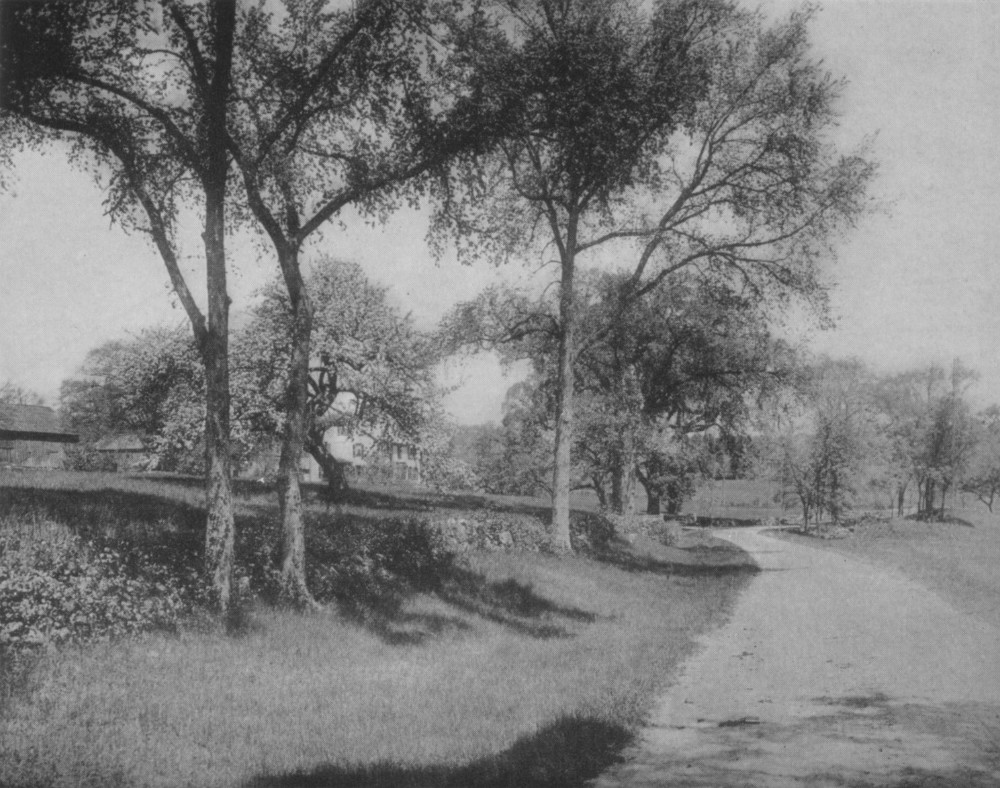 A MARLBORO ROADSIDE 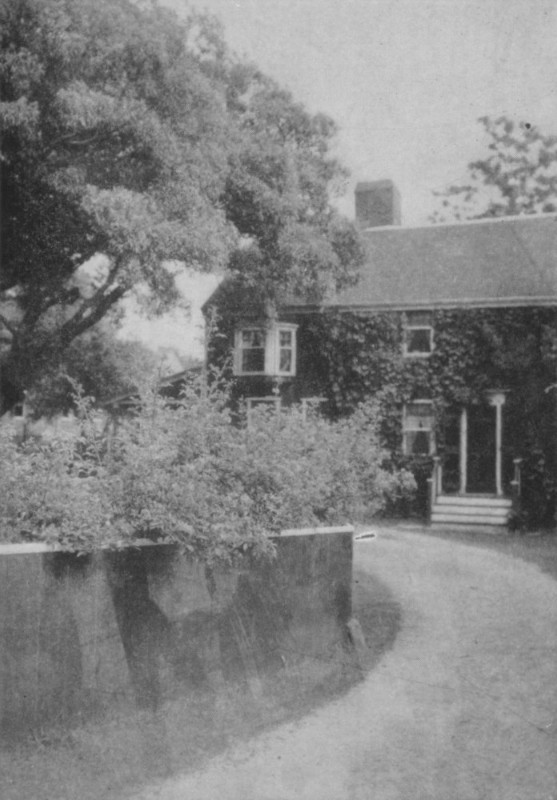 NANTUCKET  PLYMOUTH Uncle Hy had never heard of skis nor
did I ever know him to wear snowshoes. He required neither, so long as he
fellowshiped with this colt. There was exercise a-plenty, and fresh air moving
past at an alarming rate and an intimate acquaintance with snow banks. It was
winter sport of a strenuous and absorbing character. In the dim distance we cannot now
recollect how long the association continued, but we do remember that it was
finally dissolved by mutual consent with pleasure on both sides of the
partnership. Before the end came, however, much history was written and many
places were visited "where man never trod before." The neighbors
helped, or they tried to. Fifield thought Uncle Hy whipped the colt too much.
Uncle Laban thought a colt should be touched up with a whip. Cottle was of the
opinion that the animal would go along all right if he was let alone, but Uncle
Hy wanted to go with him. Young said Uncle should talk pleasantly to the horse,
Uncle was saying nothing eloquently. No one could say the colt did not try,
only Uncle Hy seemed not to speak his language. What was desired was synchronism
between the front and the hind legs. Instead they worked like the escapement of
a Simon Willard banjo clock. Sometimes when Uncle Hy suggested that the colt go
along the animal went into the air at the forward end; sometimes when it was
desired to stop him the rear end went up. There was nothing the matter with
either end, but the harmony which Uncle Hy sought seemed lacking. The colt was
a self-made horse, satisfied with the job. That he could acquire a high school
education all by himself was a mark of genius. Most horses can go ahead or back
up. In addition to these movements of progression and retrogression the colt
could move sidewise to shame any crab and follow any given diagonal provided
you did not give it to him. Furthermore, the animal had humor. At one moment he
was all fours in the air, body uppermost, and again he was rolling in the snow
all fours in the air. He loved the snow and it was a joy to him just to be
alive. There was no doubt the animal was a philosophical entity or some parts
would have come loose in the experience of that winter. Coming in from a playful morning
with the thermometer well below zero both man and horse were in spots in
profuse perspiration, which showed good blood and proved that they had not lost
a moment. Uncle Hy had frost on his eyebrows but fire in his eyes. The colt was
like Borah. You never knew what he would do next, but you knew he would do
something and do it without consulting anyone. His purposes were subtle and his
mind serene. He had the infinite variety of Cleopatra and like her was fitted
to entertain any man. |